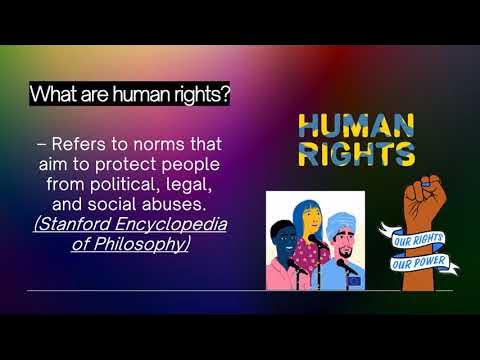PC1987 / ARTICLE. 3 BILL OF RIGHTS / SECTION 1 - 22
Summary
TLDRThe video script discusses the Philippine Constitution of 1987, focusing on Article 3, the Bill of Rights. It covers key rights such as due process, freedom from unreasonable searches and seizures, privacy of communication, freedom of speech and religion, and the right to information. It also addresses the prohibition of cruel punishment, the right to counsel, and the prohibition of double jeopardy. The script emphasizes the importance of these constitutional protections for the citizens of the Philippines.
Takeaways
- 📜 The script discusses the Philippine Constitution of 1987, focusing on Article 3, which is the Bill of Rights.
- 🏡 Section 1 emphasizes the right to life, liberty, and property, and prohibits deprivation without due process of law.
- 🔍 Section 2 protects against unreasonable searches and seizures, requiring warrants based on probable cause.
- 💌 Section 3 guarantees the privacy of communication and correspondence, except under lawful orders or for public safety.
- 🗣️ Section 4 upholds freedom of speech, expression, and the press, as well as the right to assemble and petition.
- 🕍 Section 5 prevents the establishment of a state religion and ensures the free exercise of religious beliefs.
- 🏠 Section 6 ensures the liberty of abode and the right to travel, with limitations for national security or public health.
- 📄 Section 7 recognizes the right to information on matters of public concern, including access to official records.
- 🏭 Section 8 protects the right to form unions and associations for lawful purposes.
- 🏛️ Section 9 mandates just compensation for private property taken for public use.
- 📢 Section 12 ensures the right to remain silent and to legal counsel for those under investigation for offenses.
Q & A
What does the Philippine Constitution of 1987 guarantee in Article 3, Section 1?
-The Philippine Constitution of 1987, in Article 3, Section 1, guarantees that no person shall be deprived of life, liberty, or property without due process of law, nor shall any person be denied the equal protection of the laws.
What protections are provided against unreasonable searches and seizures according to the Constitution?
-The Constitution protects the people's right to be secure in their persons, houses, papers, and effects against unreasonable searches and seizures. It states that no search warrant or warrant of arrest shall issue except upon probable cause determined by a judge after examination under oath or affirmation of the complainant and witnesses.
How does the Philippine Constitution ensure the privacy of communication and correspondence?
-The Constitution ensures the privacy of communication and correspondence is inviolable, except upon lawful orders of the courts or when public safety or order requires it, as prescribed by law.
What are the rights protected under Article 3, Section 4 of the Philippine Constitution?
-Section 4 protects the freedom of speech, of expression, or of the press, and the right of the people peaceably to assemble and petition the government for redress of grievances.
What is the significance of Article 3, Section 5 regarding religious freedom?
-Section 5 ensures that no law shall be made respecting an establishment of religion or prohibiting the free exercise thereof. It guarantees the free exercise and enjoyment of religious profession and worship without discrimination or preference, and no religious tests shall be required for the exercise of civil or political rights.
How does the Philippine Constitution safeguard the right to travel and change abode?
-The Constitution guarantees the liberty of abode and the right to change the same within the limits prescribed by law. It also states that the right to travel shall not be impaired except in the interest of national security, public safety, or public health as provided by law.
What rights are recognized in relation to access to information on matters of public concern?
-The Constitution recognizes the right of the people to information on matters of public concern, including access to official records, documents, and papers pertaining to official acts, transactions, or decisions, and the government research data used as a basis for policy development.
What protections does the Philippine Constitution provide for private property?
-The Constitution states that private property shall not be taken for public use without just compensation.
What are the rights of a person under investigation for an offense as outlined in Article 3, Section 12?
-Section 12 guarantees the right to be informed of one's right to remain silent and to have competent and independent counsel. If the person cannot afford counsel, one must be provided. These rights cannot be waived except in writing and in the presence of counsel.
How does the Philippine Constitution address the prohibition of cruel and unusual punishment?
-The Constitution prohibits excessive fines and cruel, degrading, or inhuman punishment. It also states that the death penalty shall not be imposed unless for compelling reasons involving heinous crimes, as provided by law.
What is the significance of Article 3, Section 22 in relation to the prohibition of ex post facto laws?
-Section 22 prohibits the enactment of ex post facto laws or bills which change the legal status or consequences of an action after it has already been done, especially making an action illegal after it has been committed.
Outlines

このセクションは有料ユーザー限定です。 アクセスするには、アップグレードをお願いします。
今すぐアップグレードMindmap

このセクションは有料ユーザー限定です。 アクセスするには、アップグレードをお願いします。
今すぐアップグレードKeywords

このセクションは有料ユーザー限定です。 アクセスするには、アップグレードをお願いします。
今すぐアップグレードHighlights

このセクションは有料ユーザー限定です。 アクセスするには、アップグレードをお願いします。
今すぐアップグレードTranscripts

このセクションは有料ユーザー限定です。 アクセスするには、アップグレードをお願いします。
今すぐアップグレード5.0 / 5 (0 votes)






